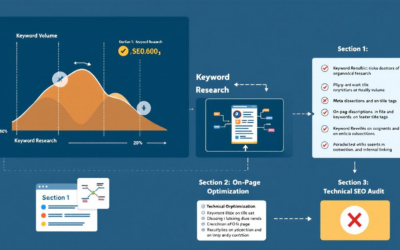Is your site suffering because multiple pages target the same keywords? This issue is called content cannibalization. Duplicate pages can contribute to content cannibalization by spreading out your ranking power. It can hurt your SEO by spreading out your ranking power. In this article, you’ll learn what content cannibalization is, why it happens, and how to fix it.
Key Takeaways
- Content cannibalization happens when multiple pages on your site target the same keyword, leading to competition among your own pages and hurting search rankings.
- Identifying content cannibalization involves using tools like Google Search Console, manual Google searches, and SEO tools to detect keyword overlaps and monitor rankings.
- Fixing content cannibalization can include consolidating content, managing duplicate pages with canonical tags, using 301 redirects, noindex tags, and optimizing internal links to guide search engines better.
What is Content Cannibalization?
Content cannibalization occurs when multiple pages on a website target the same or similar search intents, causing competition between pages and hindering their ability to rank effectively. This issue often arises from a lack of proper content planning and can lead to a self-perpetuating cycle of poor performance. When companies continuously create new content without a coherent strategy, they inadvertently produce more pages that compete for the same keywords, exacerbating the problem.
The primary causes of content cannibalization include inadequate planning and technical mistakes during content publication. Without a clear content strategy, it’s easy to lose track of target keywords, resulting in multiple pages vying for the same search queries. This not only confuses search engines but also dilutes the ranking power of each page, making it harder for any single page to achieve a high position in search engine results.
Understanding Content Cannibalization

When several of your site’s pages target alike or identical keywords, keyword cannibalization happens, leading to a contest for search engine rankings among your own pages. This phenomenon, known as keyword cannibalization in SEO, can be detrimental to your site’s performance. Imagine having several pages on your website all optimized for the same keyword “shoes.” Instead of leveraging the power of long-tail keywords like “running shoes” or “formal shoes,” each page ends up competing for the same keyword, diluting their ranking potential.
Duplicate pages can also lead to content cannibalization, as search engines struggle to identify the primary version of the content. Using canonical tags can help consolidate ranking power and address these issues.
Such overlaps in keyword usage can bewilder search engines, hindering all the involved pages from achieving good rankings. A more authoritative page may eclipse a less authoritative one when several pages vie for the same keyword.
Understanding Keyword Cannibalization
Keyword cannibalization is a specific type of content cannibalization that occurs when multiple pages on a website target the same keyword or phrase. This situation can confuse search engines, making it difficult for them to determine which page is most relevant for a particular search query. As a result, all the pages involved may suffer from lower search engine rankings and decreased click-through rates.
Several factors can lead to keyword cannibalization, including duplicate content, similar content spread across multiple pages, unclear keyword targeting, and poor website architecture. When search engines encounter multiple pages optimized for the same keyword, they struggle to decide which page should rank higher, often leading to none of the pages performing well. This can significantly impact your site’s visibility and traffic, making it crucial to identify and address keyword cannibalization issues promptly.
Why Content Cannibalization Happens
Inadequate content planning serves as a primary source of content cannibalization. When new content is constantly published without a coherent strategy, it’s easy to lose sight of target keywords, leading to keyword overlaps. Inadequate content planning can also result in duplicate pages, which can dilute ranking power and confuse search engines. The problem can also stem from imperfect keyword research, a classic error being the creation of distinct pages for minor variations of an identical keyword.
Another culprit is the lack of a keyword strategy. Without a defined plan, pages can inadvertently target the same keywords or topics, causing unnecessary competition among your site’s pages. Such uncoordinated efforts typically result in multiple pages contending for the same search engine results, thereby causing keyword cannibalization problems.
The Negative Impact of Content Cannibalization
Your website’s performance can suffer several adverse impacts due to keyword cannibalization. It can reduce the authority of your pages, waste Google’s crawl budget, and create a poor user experience. Duplicate pages can also dilute the ranking power of each page, making it harder for search engines to identify the primary version of your content. Each of these factors can significantly impact your search engine rankings and overall site performance.
Reduced Page Authority
Keyword cannibalization leads to the division of authority signals, like backlinks and user experience, among multiple pages. This dilutes the ranking power of each page, preventing any single page from becoming highly authoritative. For example, if two pages are optimized for the same keyword, the backlinks and internal links pointing to both pages are split, reducing the overall authority each page could achieve.
The consequent fall in rankings on SERPs can harm your site’s visibility and traffic.
Wasted Google Crawl Budget
Google’s crawl budget is the number of pages Googlebot can and wants to crawl and index on your site within a given timeframe. Content cannibalization forces Google to index multiple similar pages, wasting valuable resources that could be directed towards indexing unique, significant ones.
Wasting Google’s crawl budget on redundant pages can prevent more valuable pages from being indexed, negatively impacting your site’s visibility and overall search engine performance.
Poor User Experience
Presenting users with multiple pages on the same topic, keyword cannibalization can cause confusion and frustration. Users may struggle to determine which page has the most up-to-date or comprehensive information, resulting in a poor user experience when navigating through multiple URLs.
This confusion can increase bounce rates and reduce conversions, as users leave your site without finding the information they need. The improper internal linking that often accompanies content cannibalization can further complicate navigation, making it harder for users to find relevant content.
How to Identify Content Cannibalization Issues

To maintain a robust SEO strategy, it’s vital to identify content cannibalization issues. Tools like Google Search Console, manual Google searches, and various SEO tools can help detect keyword overlaps and monitor keyword rankings. A good initial step towards identifying overlapping content is creating a spreadsheet that lists page URLs and their related keywords.
During content audits, it is also important to identify duplicate pages. Managing duplicate pages effectively, particularly through strategies like canonicalization, helps search engines identify the primary version of duplicate content, consolidating ranking power and addressing issues related to keyword cannibalization.
Monitoring keyword overlaps using tools like Google Analytics can also help you understand where competition occurs and analyze traffic patterns for pages suffering from cannibalization. Prompt detection and resolution of these issues requires regular content audits.
Using Google Search Console
Google Search Console serves as an effective instrument for detecting keyword cannibalization issues. Start by signing in and navigating to the ‘Search results’ section in the performance menu. This section allows you to analyze ranking keywords and corresponding URLs on the search engine results page.
Scrolling down to see a list of search queries and then navigating to the Pages tab can help you identify which URLs rank for the same keyword. Manually analyzing all pages listed in the Pages tab can reveal any content cannibalization issues related to the same search query.
Manual Google Searches
Content cannibalization can also be detected through manual Google searches. Use the search operator ‘site:[yourdomain.com] [target keyword]’ to find all indexed pages targeting the same keyword. Although time-consuming, this method can uncover overlapping content that might not be immediately apparent.
SEO Tools
Several SEO tools are available that can aid in identifying and managing duplicate keyword rankings. Tools like SEMRush’s position tracking tool can monitor Google rankings and identify potential keyword cannibalization cases. Moz Keyword Explorer can track ranked keywords, helping you spot overlaps.
Dedicated tools such as SEOScout Cannibalization Checker and Keylogs Keyword Cannibalization Checker can efficiently manage and identify keyword cannibalization, making it easier to address these issues.
Fixing Content Cannibalization

Addressing content cannibalization requires a blend of actions, including:
- Consolidation of overlapping content
- Usage of 301 redirects
- Canonical tags
- Noindex tags
- Optimization of internal links
Canonical tags are particularly useful for managing duplicate pages by helping search engines identify the primary version of duplicate content, thereby consolidating ranking power and addressing issues related to keyword cannibalization.
Consolidating overlapping content into comprehensive pages can enhance authority and prevent cannibalization.
It is critical to select a preferred page for each affected keyword and clearly signal this preference to Google. Optimizing the preferred page by including the relevant keyword in:
- the title tag
- URL
- H1 tag
- content
can help improve its search rankings.
301 Redirects
To consolidate ranking power, 301 redirects effectively channel all traffic and ranking signals from several pages to one preferred page. This method can eliminate internal competition by merging relevant content from cannibal pages into a stronger preferred page.
After implementing 301 redirects, update internal links to point to the preferred page to prevent further internal redirects. Ensure that 301 redirects remain in place for at least one year to allow Google to reindex the preferred page.
Canonical Tags
Canonical tags serve to inform search engines about the primary version of duplicate content. Properly using canonical tags can consolidate ranking power and prevent keyword cannibalization.
Noindex Tags
Noindex tags, by instructing search engines not to index a page, prevent it from appearing in search results. Use noindex tags as a last resort, especially on blog tag pages with thin content, no backlinks, and no organic traffic.
Optimizing Internal Links
To avoid keyword cannibalization, optimizing internal links aids in guiding Google to the correct page and clarifying the site’s structure. Using exact match internal links repeatedly can confuse search engines about which page is authoritative.
Establishing distinct keyword responsibilities within campaigns prevents competing for the same clicks and clarifies each keyword’s role.
Technical Fixes for Content Cannibalization
To effectively fix content cannibalization, several technical solutions can be employed. One of the most effective methods is using 301 redirects. By redirecting cannibalized pages to a preferred page, you can consolidate ranking power and eliminate duplicate content. This approach ensures that all traffic and ranking signals are directed to a single, stronger page, improving its chances of ranking higher in search engine results.
Another useful technique is the implementation of canonical tags. Canonical tags inform search engines about the primary version of a duplicated page, helping to consolidate ranking power and prevent duplicate content from being indexed and crawled. This method is particularly effective for managing similar content across multiple pages.
Additionally, noindex tags can be used to exclude certain pages from search engine results. While this method does not allow for the transfer of ranking signals, it can be useful for pages with thin content, no backlinks, or no organic traffic. By instructing search engines not to index these pages, you can prevent them from appearing in search results and reduce the risk of content cannibalization.
Fixing Content Cannibalization with Content Strategy
A well-planned content strategy is essential for preventing content cannibalization. By focusing on topics first and then on keywords, companies can create content that is more targeted and less likely to cannibalize other pages. This approach ensures that each piece of content serves a distinct purpose and addresses specific search intents.
Regular content audits are also crucial for maintaining a healthy content strategy. These audits help ensure that your content aligns with both readers’ interests and marketing goals. By identifying and addressing any gaps or redundancies, you can refine your content to better meet the needs of your audience and improve your search engine rankings.
Creating comprehensive long-form pages that cover multiple subtopics can also help reduce the risk of content cannibalization. These pages provide a wealth of information in one place, making it easier for readers to find what they need and reducing the likelihood of creating multiple pages that compete for the same keywords.
Preventing Future Content Cannibalization

To stave off future content cannibalization, it’s necessary to develop a keyword strategy, conduct regular content audits, and focus on search intent. A well-devised content strategy guarantees the elimination of competition or overlap between different pages on your website. Additionally, a good keyword strategy can help avoid creating duplicate pages by ensuring each page targets unique keywords, thus preventing the need for canonicalization.
Frequent updates and adjustments to keywords to align with changing search intents can also act as a preventive measure to fix keyword cannibalization and avoid keyword cannibalization issues.
Developing a Keyword Strategy
A meticulously constructed content plan should aim at a specific set of keywords and search queries, guaranteeing focused and successful efforts. Using keyword research tools helps identify unique keywords for each piece of content, preventing overlap.
Make sure not to publish multiple pages that focus on the same keyword and cater to the same search intent. This can help avoid competition and confusion for search engine rankings. Check the site before creating content. You can use tools like Semrush’s Position Tracking or Google Search Console to monitor your website’s rankings. These tools can provide valuable insights into the performance of your website in search results.
Regular Content Audits
Regular content audits help align your content with both reader interests and marketing objectives. This practice allows for the identification of any gaps and areas for improvement. Regularly checking for search term overlaps within your keywords helps identify and resolve content redundancies.
Audits should include a review of performance metrics to refine keyword targeting and minimize overlap.
Focus on Search Intent
Creating content that caters to specific search intents ensures that each page caters to distinct queries, thereby preventing overlap. Aligning your content with specific search intents ensures each page targets a distinct keyword, avoiding cannibalization.
Incorporating topic-based marketing into your strategy helps avoid neglecting content quality while focusing on keyword research.
Best Practices for Avoiding Same Keyword Cannibalization
To avoid same keyword cannibalization, companies should follow several best practices. First, conduct regular keyword research to identify potential cannibalization issues. This proactive approach helps you stay ahead of any problems and ensures that each page targets unique keywords.
Second, use tools like Google Search Console to identify duplicate content and cannibalization issues. These tools provide valuable insights into your website’s performance and help you pinpoint areas that need attention.
Third, create a content strategy that focuses on topics first and then on keywords. This approach ensures that your content is well-targeted and less likely to overlap with other pages.
Fourth, implement technical solutions like 301 redirects and canonical tags to fix cannibalization issues. These methods help consolidate ranking power and prevent duplicate content from affecting your search engine rankings.
Finally, regularly audit your content to ensure that it aligns with both readers’ interests and marketing goals. By keeping your content strategy up-to-date and addressing any issues promptly, you can reduce the risk of same keyword cannibalization and improve your search engine rankings.
By following these best practices, companies can effectively manage and prevent keyword cannibalization, ensuring that their content strategy remains robust and effective.
Summary
Keyword cannibalization can significantly undermine your SEO efforts by diluting page authority, wasting Google’s crawl budget, and creating a poor user experience. Identifying and fixing these issues is crucial for maintaining a strong SEO strategy.
Remember, a well-structured keyword strategy, regular content audits, and focusing on search intent can prevent future content cannibalization. Implementing these practices will help you build a more robust and effective content strategy. Keep your content focused, unique, and aligned with your audience’s needs.
Frequently Asked Questions
What is keyword cannibalization?** **?
Keyword cannibalization happens when multiple pages on a website target the same or similar keywords, causing competition among the site’s pages for search engine rankings. It’s important to avoid this to improve your website’s SEO.
How can I identify content cannibalization on my website?** **?
You can identify content cannibalization on your website by using tools like Google Search Console, manual Google searches with the ‘site:[yourdomain.com] [target keyword]’ operator, and SEO tools such as SEMRush and Moz Keyword Explorer. This will help you find overlapping content and take necessary actions.
What are 301 redirects, and how do they help?** **?
301 redirects help to consolidate multiple pages targeting the same keywords into a single page with the strongest SEO potential, directing all traffic and ranking signals to the preferred page. This can help improve the SEO performance of the website.
Why is regular content auditing important?** **?
Regular content auditing is important because it helps ensure that your content aligns with readers’ interests and marketing goals, while also identifying and resolving redundancies and overlaps.
How can focusing on search intent help prevent keyword cannibalization?** **?
Focusing on search intent helps prevent keyword cannibalization by ensuring each page addresses unique queries, avoiding competition for the same keywords. Try to create content based on specific search intents to prevent overlap and competition among your pages.









